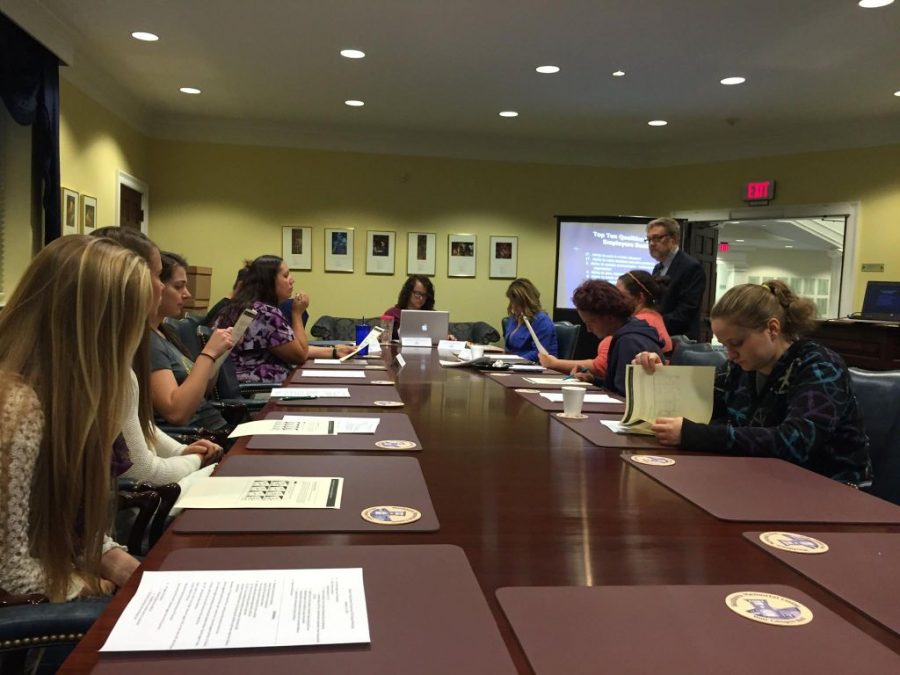Students receive advice for spring enrollment
October 22, 2015
There is more to be gained through time spent at a university than just earning your degree. It is just as much about taking the right classes to get the most out of one’s experience, and enrollment is a good start. Advanced registration for the spring 2016 semester begins Nov. 2, but before enrolling, there are a few things students should to know.
First of all, students must check the number of credit hours they have completed and identify their class standing. Check My Washburn to find your class standing.
Next, make sure you know your alternate PIN, which students obtain from their advisor. Students can then enroll themselves on MyWashburn under the “Academics” tab. Students may enroll as early as midnight on their assigned enrollment day.
The objective for students is to graduate and find the right career, which takes quite a bit of planning. Kent McNally, Director of Washburn Career Services, commits huge amounts of time each semester helping students plan for their careers after graduation. Career services offers resume tips, coordinates career fairs and holds mock interviews, among several other services.
McNally visits classes and student organizations to share his knowledge of job-readiness skills and career advice. Graduation is every student’s goal, but here’s a fresh thought: Instead of focusing on solely getting the degree, target the additional qualities you will need as a young professional and start developing beyond your major’s requirements.
Transferrable skills are skills acquired during activities throughout life. These are the skills learned through working in teams and leadership programs, which aren’t always related to an individual’s academic major. These are the types of traits that employers look for in applicants, skills that can be acquired in a variety of ways here at Washburn.
Time management, team building and public speaking are all transferable skills that can be honed in a classroom setting. Some classes are better fits than others, so to find yours, consider early registration to ensure you have an interesting and productive semester.
All students are different. Some prefer to enroll later, others plan their upcoming semesters far in advance. Glynnis Debenham, junior elementary education major, says she plans out her classes about a year in advance and usually enrolls at midnight.
“I want to be able get the professor I want at the time that I want, which is kind of hard because there aren’t a lot of time slots open,” Debenham said. “I plan out a year ahead, to make sure I’m on track to get in my program.”
Christina Workman, senior business management major, takes evening classes at Washburn. She doesn’t enroll early, but rarely has trouble getting into the classes she needs. Even if it’s hard to find the time, she says it is still valuable to talk to an advisor.
“Having to meet with my advisor with my work schedule is tricky sometimes, but I talk to her to make sure I’m taking the classes I need to graduate,” Workman said.
Early in your college career, there is often more flexibility with schedules, due to general education requirements. Classes picked as electives may seem like a chance to get an easy A, but they are also an opportunity to add some diverse additional knowledge and expertise to your skill set.
Electives might be good for some extra emphasis in areas that you may be lacking. For example, if you think you need additional writing and grammar practice, take an extra English class, or at least a course with more essay writing than tests. Fit electives to your needs, and pick the ones that fill in the gaps your major might not fill.
“I think you should look for the classes that provide complementary skills to the things you’re going to get in your major,” said McNally, on the topic of choosing electives.
One plus to planning ahead is that it raises the likelihood for students to get the classes they need at the most convenient time. Not all courses are offered every semester. Even something like a prerequisite course filling up may affect your graduation date.
“If you wait to enroll, some of the courses and sections you want to get into may be filled. Planning your class schedule is going to be problematic if you wait,” McNally said.
Whether you have trouble getting into classes or not, do consider what to do with those electives, and make the most of your general education. The transferable skills you could take away might just give you that edge employers are looking for.
Students Today, Alumni Tomorrow is an organization focused on building successful college graduates. The organization’s goal is to introduce current students to the Washburn Alumni Association before graduating. Being a part of a student organization like STAT is another way to practice transferable skills like leadership and teamwork. Interacting with Washburn Alumni could even help you settle in on a major if you’re undecided, or give you motivation to finish school sooner (and enroll earlier).



